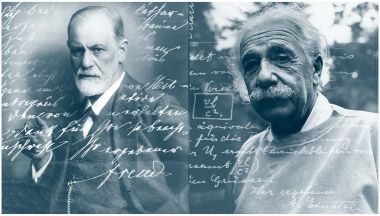
Why War?
Inspired by the International Association for Relational Psychoanalysis and Psychotherapy (IARPP) May 2024 online colloquium of the same name, this workshop will explore the question: Why war? We’ll begin with the famous correspondence between Einstein and Freud, then turn to Fromm’s contributions to our understanding of human aggression. We’ll examine psychic mechanisms such as splitting, projection, displacement, othering, and identification with the aggressor. We'll also consider Rozmarin’s ideas about belonging and the “demands” violence places on group members. Other topics may include the notion of a “just” war, the pleasure of violence, and gendered aspects of aggression.
This class is not a debate between ideological positions. Rather, we will use psychoanalytic concepts and frameworks to explore why war exists and persists. Participants are welcome to bring in topics and readings to enrich our shared inquiry.
NCSPP is aware that historically psychoanalysis has either excluded or pathologized groups outside of the dominant population in terms of age, race, ethnicity, nationality, language, gender, religion, sexual orientation, socioeconomic status, disability, and size. As an organization, we are committed to bringing awareness to matters of anti-oppression, inequity, inequality, diversity, and inclusion as they pertain to our educational offerings, our theoretical orientation, our community, and the broader world we all inhabit.
Presenter's Response:
When exploring psychic mechanisms such as splitting, projection, displacement, we will observe and analyze how targets of othering tend to be people of marginalized and disadvantaged groups.
At the end of this course, participants will be able to:
-
identify three major points that Einstein and Freud make about the causes of war and possible ways of resolving it.
-
articulate the two types of human aggression according to Fromm.
-
describe two main aspects of Rozmarin’s theory regarding violence as a demand a group puts on its members and the need to expand the notion of
belonging. -
explain two ways in which psychic mechanisms, including splitting, projection and othering, are involved in making war possible.
- Frosh, S. (2002). The other. American Imago (59)(4): 389-407.
- Guralnik, O. (2024). Splitting now. Psychoanalytic Dialogues 34: 145-146.
- Rozmarin, E. (2024). Belonging and its discontents. Psychoanalytic Dialogues 34: 250-263.
- Rozmarin, E. (2020). Fathers don’t cry: On gender, kinship, and the death drive. Studies in Gender and Sexuality 21:38-47.
- White, K. (2022). The correspondence between Albert Einstein and Sigmund Freud in “Why War” and the socio-political perspective of Alfred Adler. International Journal of Psychoanalysis 103:480-494.
Michael Korson, LMFT, CGP, is a personal and supervising analyst at the Psychoanalytic Institute of Northern California (PINC) and on the faculties at PINC (Group Process Faculty) and the San Francisco Center for Psychoanalysis. He has a private practice in San Francisco, California. He has published on topics including the candidate’s experience as well as practice during the Coronavirus pandemic.
This intermediate course is for clinicians and non-clinicians with an interest in grappling with the troubling topic of what makes for human wars. Some background in principles of psychoanalytic theory will be helpful. Other contributions, from sociological or other perspectives, are welcome.
LCSW/MFTs: Course meets the requirements for 4 hours of continuing education credit for LMFTs, LCSWs, LPCCs and/or LEPS, as required by the CA Board of Behavioral Sciences. NCSPP is approved by the California Association of Marriage and Family Therapists (Provider Number 57020), to sponsor continuing education for LMFTs, LCSWs, LPCCS, and/or LEPs. NCSPP maintains responsibility for this program /course and its content.
Psychologists: Division 39 is approved by the American Psychological Association to sponsor continuing education for psychologists. Division 39 maintains responsibility for these programs and their content.
Certificates of Attendance for CE credits will be sent to those participants who attend the entire workshop and return a completed course evaluation.
Enrollees who cancel at least SEVEN DAYS prior to the event date will receive a refund minus a $35 administrative charge. No refunds will be allowed after this time. Transfers of registrations are not allowed.
For program related questions, contact Natasha Oxenburgh, MA, at NOxenburgh@NCSPP.org.
For questions related to enrollment, locations, CE credit, special needs, course availability, to obtain the grievance policy or report a grievance, or any other administrative issues contact Niki Clay by email or 415-496-9949.
Education Committee
The Education Committee is responsible for the development of a variety of courses and workshops given throughout the year in San Francisco and the East Bay.

